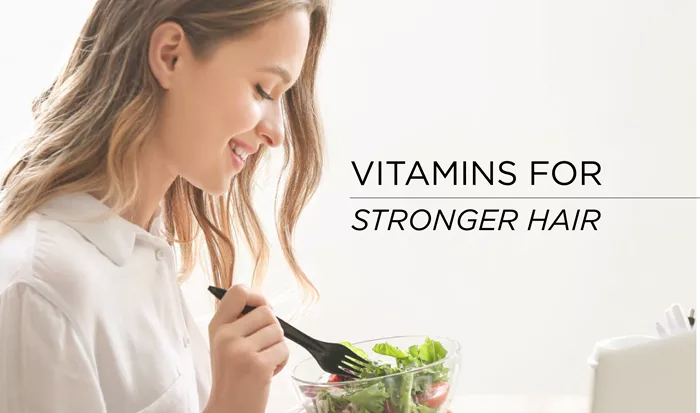As a hair stylist, I’ve seen firsthand how diet impacts the health of your hair. Shiny, strong, and vibrant hair isn’t just about using the right shampoo or getting regular trims—it starts from within. What you eat plays a huge role in hair growth, strength, and overall appearance. In this guide, I’ll break down the best foods and nutrients for healthy hair, using simple, actionable advice. Let’s dive in!
Why Diet Matters for Hair Health
Hair is made of keratin, a type of protein produced by hair follicles. These follicles rely on vitamins, minerals, and other nutrients to function properly. Poor nutrition can lead to weak, brittle hair, slow growth, or even hair loss. By eating the right foods, you nourish your follicles, improve scalp health, and give your hair the tools it needs to thrive.
Key Nutrients for Healthy Hair (and Where to Find Them)
Protein: The Building Block of Hair
Hair is mostly protein, so a lack of it can cause hair thinning or shedding. Protein provides amino acids that strengthen hair strands and repair damage.
Best Sources:
- Eggs (also rich in biotin!).
- Chicken, turkey, or lean beef.
- Fish like salmon or tuna.
- Plant-based options: lentils, quinoa, tofu, or chickpeas.
Tip: Add a handful of nuts or Greek yogurt to your snacks for an easy protein boost.
Biotin (Vitamin B7): For Stronger Strands
Biotin is famous for promoting hair strength and growth. A deficiency can lead to brittle hair or hair loss.
Best Sources:
- Eggs (especially the yolk).
- Almonds, walnuts, and sunflower seeds.
- Sweet potatoes, spinach, and broccoli.
- Whole grains like oats or brown rice.
Recipe Idea: Blend a smoothie with spinach, almond butter, and a banana for a biotin-rich breakfast.
Iron: Oxygen for Hair Follicles
Iron helps red blood cells carry oxygen to your scalp and follicles. Low iron levels are linked to hair loss, especially in women.
Best Sources:
- Red meat, chicken, or shellfish (clams are super high in iron!).
- Plant-based: lentils, spinach, tofu, or fortified cereals.
- Pair iron-rich foods with vitamin C (like lemon juice) to boost absorption.
Signs of Deficiency: Fatigue, pale skin, or excessive shedding.
Omega-3 Fatty Acids: Hydration and Shine
Omega-3s reduce scalp inflammation and add moisture to dry, frizzy hair. They also support hair density.
Best Sources:
- Fatty fish (salmon, mackerel, sardines).
- Chia seeds, flaxseeds, or walnuts.
- Avocados or algae-based supplements.
Tip: Eat salmon twice a week or sprinkle flaxseeds on oatmeal.
Vitamin A: Healthy Scalp = Healthy Hair
Vitamin A helps produce sebum, the oily substance that moisturizes your scalp. Too little can cause dandruff; too much can be harmful.
Best Sources:
- Orange veggies: carrots, sweet potatoes, pumpkin.
- Dark leafy greens (kale, spinach).
- Liver or cod liver oil (in moderation).
Vitamin C: Collagen and Antioxidant Power
Vitamin C helps build collagen (a protein that strengthens hair) and fights free radicals that damage follicles.
Best Sources:
- Citrus fruits (oranges, grapefruits).
- Bell peppers, strawberries, or kiwi.
- Broccoli or Brussels sprouts.
Recipe Idea: Toss bell peppers, kale, and lemon dressing into a salad.
Zinc: Repair and Growth
Zinc helps repair hair tissues and keeps oil glands around follicles healthy. A deficiency can lead to hair thinning.
Best Sources:
- Oysters, beef, or crab.
- Pumpkin seeds, chickpeas, or cashews.
- Dark chocolate (70% cocoa or higher).
Vitamin E: Protect and Nourish
Vitamin E is an antioxidant that protects hair from sun and heat damage. It also improves blood flow to the scalp.
Best Sources:
- Sunflower seeds, almonds.
- Spinach, avocado, or olive oil.
Tip: Massage vitamin E oil directly onto your scalp for extra hydration.
Selenium: Fight Breakage
Selenium supports antioxidant activity and prevents hair breakage.
Best Sources:
- Brazil nuts (just 2–3 nuts a day!).
- Tuna, eggs, or brown rice.
Water: Hydration Is Key
Dehydration makes hair dry and prone to split ends. Aim for 8–10 glasses of water daily.
Tip: Infuse water with cucumber or berries for flavor.
Foods to Avoid for Healthier Hair
- Sugar & refined carbs: Spike blood sugar, leading to inflammation and hair loss.
- Processed foods: Lack nutrients and may contain harmful additives.
- Alcohol: Dehydrates hair and depletes zinc levels.
Sample Meal Plan for Strong, Shiny Hair
- Breakfast: Spinach omelette + avocado toast + orange juice.
- Snack: Greek yogurt with berries and walnuts.
- Lunch: Grilled salmon salad with kale, sweet potatoes, and olive oil dressing.
- Snack: Carrot sticks with hummus.
- Dinner: Lentil curry with brown rice and steamed broccoli.
- Dessert: Dark chocolate square (70% cocoa).
Lifestyle Tips to Boost Hair Health
- Manage stress: High stress triggers hair loss. Try yoga or meditation.
- Sleep 7–8 hours: Hair repairs itself during sleep.
- Avoid tight hairstyles: They pull on follicles and cause breakage.
- Limit heat styling: Use heat protectant sprays if needed.
How Long Until I See Results?
Hair grows slowly—about half an inch per month. It may take 3–6 months of consistent healthy eating to notice thicker, shinier hair. Be patient!
Conclusion
Beautiful hair isn’t just about what you put on it—it’s about what you put in your body. Focus on a balanced diet rich in proteins, vitamins, and healthy fats, and pair it with good hair care habits. Your hair will thank you!
Related topics:
What Can I Eat to Improve My Hair
Does Biotin Promote Hair Growth? Experts Weigh In on the Popular B Vitamin
How Much Area Can 3000 Grafts Cover in Hair Transplant?


